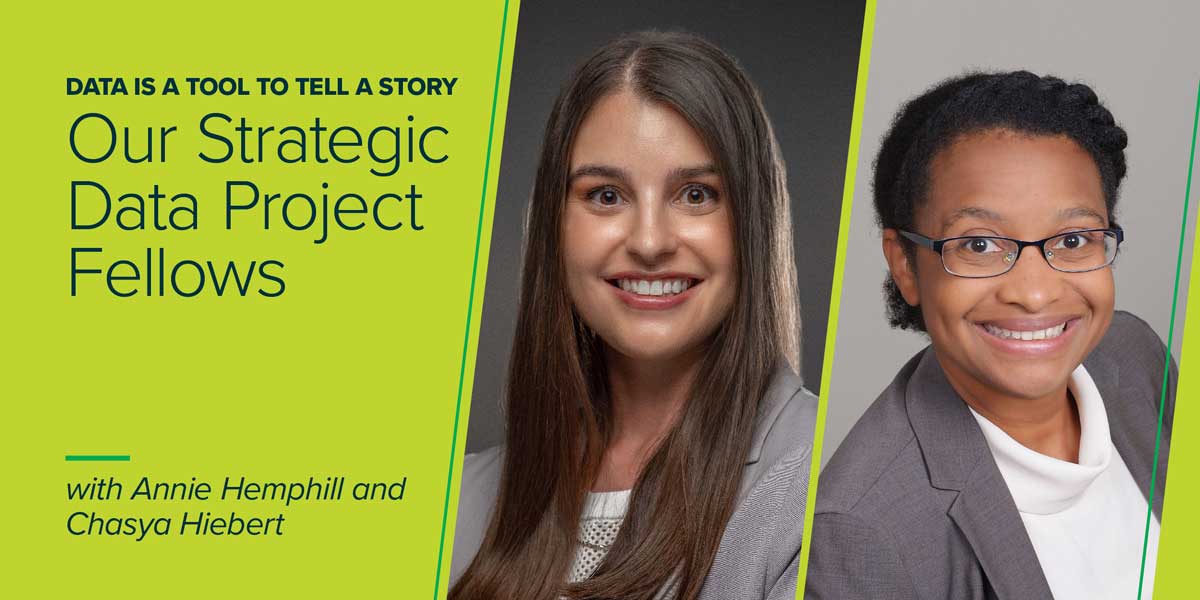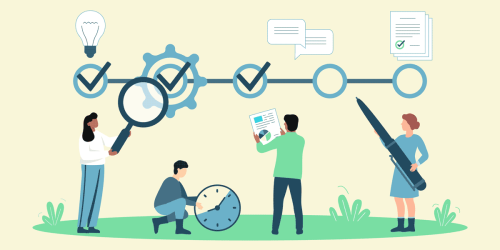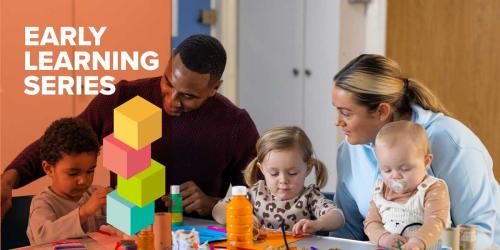Data is a Tool to Tell a Story: Our Strategic Data Project Fellows

The Strategic Data Project (SDP)—a program of Harvard University’s Center for Education Policy Research—seeks to “transform data use and improve student outcomes.” Each year, the project brings together a cohort of fellows who are placed in (or sometimes already employed by) partner organizations including school districts, state agencies, institutions of higher education, and nonprofits like Education Northwest.
Our current SDP Fellows, Annie Hemphill and Chasya Hiebert, bring the resources and expertise they gain through the fellowship to their work on Education Northwest projects.
Exploring the Intersections of Research and Policy
Annie was a grade 4 teacher in Oklahoma before getting a master’s degree in comparative international education and working at the Organization for Economic Co-Operation and Development in Paris, France. After earning a doctorate in education policy at Michigan State, she took the advice of a member of her dissertation committee and applied to the SDP. Having seen education from the classroom and through a global lens, she says, “I wanted to do the fellowship was because I felt like it gave me this interesting perspective that I hadn't had yet in the education policy and research worlds.”
Chasya had been interested in public policy since she was in high school in Connecticut. “You know, fix the world and all that stuff,” she says. She saw how economists worked with data during an internship in U.S. Senator Joseph Lieberman’s office. “It made me want to do research as a way to influence policy,” she says. After earning a doctorate in economics from the University of Washington, Chasya worked for several years at the Washington State Institute for Public Policy, where she conducted policy research and evaluation for the Washington State Legislature, particularly on the impact of state education programs. After that role, she says she wanted to work more directly on solutions. “I liked the idea of being more in the weeds of [implementation].”
It’s important to remember that data is people. We have to be careful about how we’re presenting it and what we’re doing with it. It’s not just a table. It has more significance than that.
On a more personal level, Chasya was driven to work in education by the different trajectories her father and aunt had based on their educational opportunities when they were young. Although her father and aunt were both smart, her aunt attended a school that was much less resourced than the one her father attended. Her aunt eventually fell through the cracks of the system, although she did later get her GED. Her father, who was in a school that better supported his talents and interests, obtained three master’s degrees, including one in aerospace engineering. She wondered what her aunt’s life would have been like if it had offered the same level of support as her father’s. “It made me think that education is a place to start if you want to make a difference in people’s lives.” Chasya notes that her first name is unusual. “But being a Black female economist is very unusual,” she says. The number of African Americans with an economics Ph.D., she says, “is just so crushingly low. I believe there is so much more that students can do, and the way that students are being educated is limiting that potential.”
Plugging Into Education Northwest
As SDP Fellows, Annie and Chasya had the opportunity to work on a variety of Education Northwest projects. They’ll each present to their SDP cohort on a capstone project as part of the fellowship.
Currently, Annie is working with Principal Researcher Sam Riggs on a project for the National Endowment for Financial Education. The work explores the relationship between undergraduate students’ financial literacy and their basic needs. While there is a strong association between higher financial literacy and lower basic needs insecurity, the project seeks to unpack that relationship and ask, Annie says, “does a student’s level of financial literacy tell us anything?”
The project is exciting, she says, in part because she had never done postsecondary research before coming to Education Northwest. In academia, she says, researchers can ask any question they dream up—if they can make a case for it. At Education Northwest, “questions are being formed with partners in mind and it's a much more collaborative process,” Annie says.
Chasya is involved with a pair of projects that use similar datasets. One, with Senior Researcher Grace Gowdy, focuses on Washington state’s Institutional Education program, which serves incarcerated and previously incarcerated youth. The other, with Senior Leader Michelle Hodara and Managing Researcher Julie Petrokubi, involves the Open Doors Reengagement Program, which supports youth aged 16–21 who are disconnected from the school system to provide them with paths to postsecondary success. This work is closely connected to work Chasya did at the Washington State Institute for Public Policy, where she also worked closely with the state’s Education Research and Data Center (ERDC) and Office of Superintendent of Public Instruction (OSPI).
Not Just a Table—Data is People
To a layperson, the idea of large datasets may conjure up a scene from The Matrix films, with rows of numbers and esoteric symbols falling across the screen. The SDP Fellows see data a little differently. “It’s really a tool to tell a story and to understand what's happening in the world, and also to shed light on what's not going well and the areas that we need to focus on and fix,” Annie says. And not all data is quantitative. “Data can be a lot of different things,” Annie says. “It can be crunching numbers. That's a very stereotypical view of data. But data can mean talking to community members and finding out their stories, too.”
Chasya agrees. “It’s important to remember that data is people,” she says. “Especially when doing quantitative analysis, it's really easy to just think of the data as the point. We have to be careful about how we’re presenting it and what we’re doing with it, because it’s hopefully going to have an impact on people.”
Both Data Fellows agree that SDP and Education Northwest’s approaches to and understanding of data are well aligned. “I think SDP and Education Northwest have the same philosophy of being really conscious of the fact that when we’re working with data, it’s not just a table,” Chasya says. “It has more significance than that.”
Working with data comes with a certain responsibility. “There’s an idea that data is unbiased,” Annie says. “But data only becomes useful because we are manipulating it. And we ourselves are not unbiased. We have a lot of power in the stories that that we tell through data. You need to understand the power of what you're going to say and the policies that could come about from that.”



